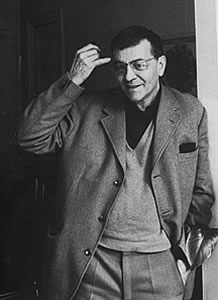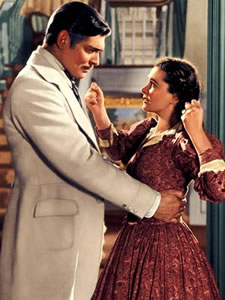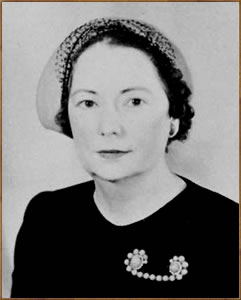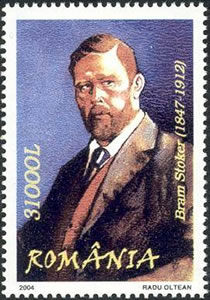|
De Duitse schrijver Peter Weiss werd geboren op 8 november 1916 in Nowawes (het tegenwoordige Neubabelsberg) bij Berlijn. Zie ook mijn blog van 8 november 2006 en ook mijn blog van 8 november 2008. xml:namespace prefix = o ns = "urn:schemas-microsoft-com:office:office" />
Uit: Die Ästhetik des Widerstands
Es handelte sich nicht um die Arbeit, so wie mein Vater von ihr sprach, um die Arbeit als Vorgang der Selbstverwirklichung, sondern um Arbeit geleistet zu niedrigstem Preis und zu höchstem Profit des
Arbeitkäufers. Da nur die Arbeitenden zu sehn waren, mit ihrem ganzen Dasein den Tätigkeiten hingegeben, wurde der Eindruck erweckt, dass sie das Werk beherrschten. Sie füllten, kraftvoll skulptiert vom Schein des Feuers, den Raum aus. Beim ersten Anblick, sagte mein Vater, als wir uns im Kunstmuseum befanden, stellen sie sich in der überwältigenden Dominanz von Produktivkräften dar. Und doch bestätigen sie nur bis ins letzte die Regeln der Arbeitsteilung. Es wirkt, als handelten sie selbständig, sie existieren aber einzig in ihrer Bindung an die Maschinen und Geräte, die das Eigentum andrer sind. Diese andern waren nicht zu sehn, die Arbeitenden jedoch waren ihnen
verdingt. Auch sie, die im verdreckten Winkel kauerten, eine Welle für sich, fast wie im Besitz eines eignen Lebens, warteten nur auf das Signal, das sie wieder zurückrief. Ihre Stärke entwickelten sie allein im Handwerk, und auch dort waren die Bewegungen ihrer Arme nicht bedrohlich, es war deutlich, dass sie diese ausschließlich zur Erzeugung von Gütern verwenden würden. Die Lobpreisung der Arbeit war eine Lobpreisung der Unterordnung. Die Männer, die sich von Funken umsprüht um die glühende Eisenmasse scharten, die sich am Trog wuschen, und sie, die übermüdet vor sich hinstarrend bei ihrer Mahlzeit saßen und vor denen die junge Frau mit dem verhärmten, ängstlich aufblickenden Gesicht die leeren Becher in den Korb packte, sie alle waren machtlos. Die Tiefe der Fabrik war unbestimmbar, die Reihen der senkrechten und horizontalen Eisenträger und Rohre zogen sich als Gitterwerk ins Unendliche hin. Der sich im Rauch verlierende Bau war eine Welt, aus der es kein Entrinnen gab. Besaßen wir heute auch eine Kantine, einen Waschraum, eine Umkleidekammer und konnten mit technischen Verbeßrungen rechnen, so war der Produktionsgang doch noch der selbe, wie Menzel ihn dargestellt hatte Achtzehnhundert Fünfundsiebzig, vier Jahre nach der Zerschlagung der Commune. Ihre gesammelte Energie legten die Arbeiter in die Herstellung der eisernen Blöcke, aus denen Schienen, Lafetten, Kanonenrohre wurden. Ihre Friedfertigkeit schmolzen sie um zu einer Gewalt, die sich, von weit draußen her, gegen sie, gegen ihre Interessen richten würde.

Peter Weiss (8 november 1916 - 10 mei 1982)
De Amerikaanse schrijfster en oorlogscorrespondente Martha Ellis Gellhorn werd geboren in St. Louis, Missouri op 8 november 1908. Zie ook mijn blog van 8 november 2008.
Uit: Is There a New Germany?
Criticize, to doubt, to probe the Germans is by now not only anti-German but apparently unAmerican. In eighteen years, we have turned an astonishing emotional and intellectual somersault. Have the Germans done anything of the sort? Is there a "New Germany," or is there simply another Germany? My acquaintance with Germany began in 1924 and continued until the end of the Nürnberg Trials, though from the summer of 1936 until American troops entered Germany during the war, I watched from a distance and listened to those who had escaped the fatherland. In these post-war years, while the United States has become officially more loving every minute toward its former enemy, I have been reading of this New Germany, and wondering. Last winter I returned to West Germany to try to find what must be New Germans, those who were children or newly born at the end of the Second World War, so young then as to be untouched by the poison their people fed on for twelve years.
I had one introduction, to a Hungarian journalist established in Germany after the Hungarian revolution of 1956. My plan was to visit universities; I meant to meet Germany's future rulers. Hitler was a freak in German history in the sense that he was semiliterate; Germany is normally directed by university graduates, and the academic title Doctor has always abounded in German governmental circles. From the University of Hamburg, through those of Free Berlin, Frankfurt, Bonn, and Munich, I was passed along by students, either casually met or introduced by the student self-government in each university. We were strangers, they having no ideas about me and I no ideas about them. There was nothing official in this tour. I would wander into a student government office and chat with anyone I could find, and in turn they whistled up anyone they could find with spare time and a wish to talk; though I did try to meet all kinds, ranging from socialist to nationalist to don't-know.

Martha Ellis Gellhorn (8 november 1908 - 16 februari 1998)
De Ameikaanse schrijfster Margaret Mitchell werd geboren op 8 november 1900 in Atlanta, Georgia. Zie ook mijn blog van 8 november 2006 en ook mijn blog van 8 november 2008.
Uit: Gone with the wind
She began asking questions so brusquely and giving orders so decisively Pork's eyebrows went up in mystification. Miss Ellen didn't never talk so short to nobody, not even when she caught them stealing pullets and watermelons. She asked again about the fields, the gardens, the stock, and her green eyes had a hard glaze which Pork had never seen in them before.
"Yas'm, dat hawse daid, layin' dar whar Ah tie him wid his nose in de water bucket he tuhned over. No'm, de cow ain' daid. Din' you know? She done have a calf las' night. Dat why she beller so."
"A fine midwife your Prissy will make," Scarlett remarked caustically. "She said she was bellowing because she needed milking."
"Well'm, Prissy ain' fixing to be no cow midwife, Miss Scarlett," Pork said tactfully. "An' ain' no use quarrelin' wid blessin's, cause dat calf gwine ter mean a full cow an' plen'y buttermilk fer de young Misses, lak dat Yankee doctah say dey'd need."
"All right, go on. Any stock left?"

Scene uit de film 'Gone with the wind'
"No'm. Nuthin' 'cept one ole sow an' her litter. Ah driv dem inter de swamp de day de Yankees come, but de Lawd knows how we gwine get dem. She mean, dat sow."
"We'll get them all right. You and Prissy can start right now hunting for her."
Pork was amazed and indignant.
"Miss Scarlett, dat a fe'el han's bizness. Ah's allus been a house nigger."
A small fiend with a pair of hot tweezers plucked behind Scarlett's eyeballs.
"You two will catch the sow -- or get out of here, like the field hands did."
Tears trembled in Pork's hurt eyes. Oh, if only Miss Ellen were here! She understood such niceties and realized the wide gap between the duties of a field hand and those of a house nigger.
"Git out, Miss Scarlett? Whar'd Ah git out to, Miss Scarlett?"
"I don't know and I don't care. But anyone at Tara who won't work can go hunt up the Yankees. You can tell the others that too."
"Yas'm."

Margaret Mitchell (8 november 1900 16 augustus 1949)
De Ierse schrijver Bram Stoker werd geboren op 8 november 1847 in Clontarf, een wijk van Dublin in Ierland. Zie ook mijn blog van 8 november 2006 en ook mijn blog van 8 november 2008.
Uit: Dracula
In the population of Transylvania there are four distinct nationalities: Saxons in the South, and mixed with them the Wallachs, who are the descendants of the Dacians; Magyars in the West, and Szekelys in the East and North. I am going among the latter, who claim to be descended from Attila and the Huns. This may be so, for when the Magyars conquered the country in the eleventh century they found the Huns settled in it.
I read that every known superstition in the world is gathered into the horseshoe of the Carpathians, as if it were the centre of some sort of imaginative whirlpool; if so my stay may be very interesting. (Mem., I must ask the Count all about them.)
I did not sleep well, though my bed was comfortable enough, for I had all sorts of queer dreams. There was a dog howling all night under my window, which may have had something to do with it; or it may have been the paprika, for I had to drink up all the water in my carafe, and was still thirsty. Towards morning I slept and was wakened by the continuous knocking at my door, so I guess I must have been sleeping soundly then.
I had for breakfast more paprika, and a sort of porridge of maize flour which they said was 'mamaliga', and egg-plant stuffed with forcemeat, a very excellent dish, which they call 'impletata'. (Mem., get recipe for this also.)
I had to hurry breakfast, for the train started a little before eight, or rather it ought to have done so, for after rushing to the station at 7:30 I had to sit in the carriage for more than an hour before we began to move.
It seems to me that the further east you go the more unpunctual are the trains. What ought they to be in China?
All day long we seemed to dawdle through a country which was full of beauty of every kind. Sometimes we saw little towns or castles on the top of steep hills such as we see in old missals; sometimes we ran by rivers and streams which seemed from the wide stony margin on each side of them to be subject to great floods. It takes a lot of water, and running strong, to sweep the outside edge of a river clear.

Bram Stoker (8 november 1847 20 april 1912)
|



